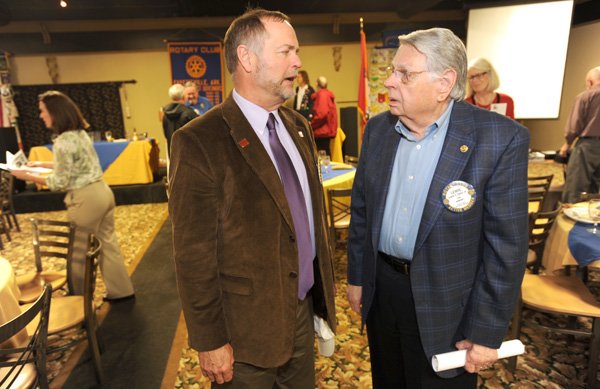FAYETTEVILLE — Every time Lewis Epley tries to move his hand, he is reminded of the day that changed his life in 1953.
It was the first day of his senior year at Springdale High School. A teacher asked Epley to perform on stage as a circus barker.
AT A GLANCE
Donations
Online donations to the Rotary Club of Fayetteville's End Polio Now Campaign, can be made online by visiting www.fayettevillerotary.org/endpolio.html
Donations may also be mailed to: P.O. Box 1683, Fayetteville, AR 72702. Checks should be made out to Rotary International, with "polio" in the memo line.
Source: Staff Report
"I was the first one to go on stage," he said. "About halfway through, she asked me to do it again and I almost fainted."
Epley was sent home from school and put to bed by his mother. The next morning, the 17-year-old felt nauseous and tired. He also had a slight fever. A day later, Epley's mom read an article in the Arkansas Gazette about the symptoms of polio. She contacted their family's physician, who confirmed her suspicions.
Epley had polio. He was among the 58,000 cases of polio diagnosed in the nation that year.
"Polio was a dreadful visitor that seemed to come each summer," Epley, who is now 74, said recently. "They used to close swimming pools and cancel public gatherings each year."
Since the introduction of the Salk vaccine in 1955 and the Sabin oral vaccine in 1962, nearly 99 percent of all polio cases around the world have been eradicated.
But for Epley, and fellow members of the Rotary Club of Fayetteville, that's not enough.
Endemic polio remains in areas of Afghanistan, India, Nigeria and Pakistan.
To reach and immunize the people in the last remaining geographic areas where polio migrates, Rotary International has launched the End Polio Now campaign. During the last 25 years, nearly $1 billion in contributions have pushed Rotary to the brink of eradicating the disease.
The organization was recently challenged to raise another $200 million to match $355 million in grants from the Bill and Melinda Gates Foundation. The resulting $555 million will directly support immunization campaigns in countries where polio continues to infect and paralyze children.
As part of the international organization's mission, the Rotary Club of Fayetteville is among nine other rotary clubs across the country that has to raise $210,000 by April. If successful, the local group will have raised enough money to immunize 350,000 children in other countries.
"When you have a project like this, it can lead to donor fatigue," said Chuck Culver, co-chairman for the local campaign. "With the fact that Rotary got the challenge grant from the Gates Foundation and because we're so close to eradicating a major disease, I think there's a new sense of enthusiasm."
As of Dec. 31, Rotarians had raised $160 million of the $200 million challenge.
Once the international club has reached its goal, the organization will have contributed $1.2 billion toward the campaign, sparing an estimated 5 million children from polio.
"It is astounding that each polio vaccination costs only 13 cents," said Dale Oliver, vice president of technology information for the local organization. "Even small donations go a long way toward eradicating polio."
Today, Epley has limited dexterity in his left hand and weakness in his arm as a result of his bout with polio, but he refuses to consider it a handicap.
"I've been able to more or less disguise my disability and most people aren't aware of it," he said. "My physical therapist drilled into me when I was 17 to focus on what I have left and not what I've lost. I think having polio helped me to be a more understanding, tolerant and compassionate person. I saw what so many others went through and I think it's probably made me have a desire to be helpful to other people whenever possible."
Epley recalls being hospitalized in Jacksonville for eight weeks when he was initially diagnosed. He said he remembers seeing children his own age with polio being rolled on gurneys in and out of the hospital.
"The young man next to me was in an isolation room," Epley said. "He was in an iron lung that looked like a 300- to 500-gallon hot water tank turned on its side that forced him to breathe. There was no cure for polio at that time, so we had to let it work its course."
Oliver said the group hopes to raise about $1,000 per member. So far, the Fayetteville-based club has raised about $200 from each of its 210 members.
Mieka Hatcher, president of the Rotary Club of Fayetteville, said the organization has raised about $40,000 of its overall goal. She said the members plan to continue working until they finish what they started 25 years ago.
"Thanks to the March of Dimes and a lot of efforts by Rotary, we started this campaign in the early 80s and pledged to eradicate polio by 2000," she said. "We were close, but not quite there. The Bill and Melinda Gates Foundation stepped in and issued a challenge. We owe it to them, and to all the great local leaders we've had over the years, to finish what we started. There's no reason why every child in the world shouldn't be immunized."
Epley said he remembers when his mom used to knock on doors and collect dimes for the fight against polio, as part of the March of Dimes campaign.
Today, the Fayetteville resident said he plans to knock on "e-doors" in hopes that people will contribute online toward the group's fundraising effort.
"I know in my own mind, that the children of the world who don't get the vaccine won't receive the care that I did and they will be shoved aside," he said. "I'd like to see polio eradicated from the world in my lifetime. I'll be 75 in April, so we better hurry. That's one of the items on my bucket list."

